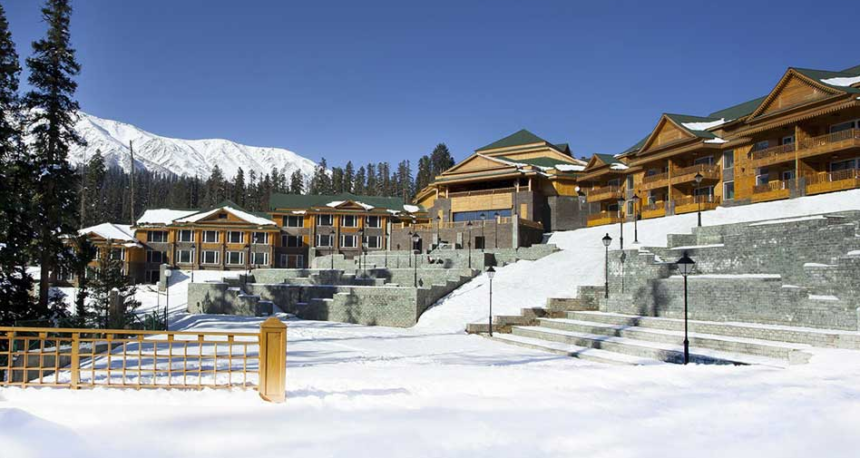The picturesque landscape of Kashmir, with its snow-capped mountains, serene rivers and lakes, and lush green forests, combined with its rich cultural heritage, including shrines, mosques, temples, and ancient structures, has earned it the title of “paradise on earth.” Visitors from around the world are drawn to Kashmir to experience its natural beauty and cultural treasures. There is a growing interest among top hotel franchises and brand owners to establish their presence in the region. The tourism sector is a significant contributor to the Union Territory’s GDP, accounting for approximately 7-8 percent and generating over INR 8000 crores approximately in annual revenue.
Consequently, it’s crucial for the land/hotel owners to be well-informed about their legal options and obligations to make decisions aligned with their business objectives. Understanding the hotel related agreements requires careful consideration to ensure that all aspects are addressed and that the interests of both parties are protected. When entering a legal contract with a hotel brand, a comprehensive understanding of various types of hotel related agreements is necessary. These agreements include:
Franchise Agreement
When assessing a potential hotel franchise, one crucial economic factor is the structure and amount of franchise fees. These fees are payments made by the franchisee to the franchisor for utilizing the brand’s name, logo, marketing, and reservation systems. Franchise fees typically include an initial fee, along with ongoing fees paid throughout the agreement’s term, which typically ranges from 10 to 15 years. The franchisor usually retains the right to terminate the agreement if the franchisee fails to meet brand standards and service requirements.
Some key fee arrangements are associated with license agreement:
Initial Fee
This fee, typically based on the hotel’s room count, is paid upon submitting the franchise application. It covers pre-contract charges such as market assessments and property inspections. The franchisor may refund the initial fee if the franchise is not approved or retain a percentage of it.
Royalty Fee
Royalty fees compensates the franchisor for allowing the use of brand’s trade name, service marks, logos, goodwill, and other franchise services. They are a major revenue source for the franchisor and are negotiable, usually ranging from 3.0% to 5.0% of room revenues. In some cases, franchisors may also require a percentage of other revenue streams, particularly food and beverage revenue, averaging around 1.0% to 2.0% of total F&B revenue.
Advertising or Marketing Contribution Fee
Often, franchisees contribute to a fund managed by the franchisor for collective marketing efforts. Typically ranging from 1.0% to 2.0% of total revenue, these fees vary by market and may be combined with the reservation fee.
Third-Party Operator Fees
Owners may opt to engage a third-party operator to oversee day-to-day operations. Utilizing a third-party manager, particularly one with local market expertise, provides assurance to the franchisor and enables owners with limited hotel experience to effectively manage their properties. Third-party operator fees typically range from 4% to 6% of total revenues and follows a structure like traditional hotel brands, comprising a base fee and incentive fee.
Third Party Operation/Management Agreements
Third-party management companies are tasked with overseeing the day-to-day operations of hotels on behalf of owners, whether these properties are independent having their own brand or franchised with hotel chains. These companies receive compensation in the form of management fees, including base and incentive fees, as well as charges for additional services such as technical support.
The concept of third-party management has experienced growth due to the increasing number of hotel owners who lack the expertise or desire to manage their properties directly. Third-party managers prioritize the interests of the owner, while branded operators prioritize the interests of the brand. While branded operators do consider owners’ interests, their primary goal is to promote and enhance the reputation of the brand. Third-party management agreements are commonly chosen for unbranded, independent properties, but they can also provide value to franchised hotels. This is particularly true when there’s a gap between owners who are unable or unwilling to manage daily operations and hotel chains primarily focused on franchising. Despite the potential for double fees—franchise fees paid to the hotel brand in addition to management fees paid to third-party operators—many owners accept this arrangement for the flexibility and control it provides over operations.
Hotel Management Agreements
The hotel management agreement is an advantageous model for both property owners and Management Company. Under such contract, the owner of the hotel property delegates operational and management responsibilities to a management company. The management company mostly owns the brand as well and the hotel operates under that brand. The owner retains ownership of both the real estate and the business, bearing the primary risk, while compensating the management company for its day-to-day management services.
Certainly, several key features are associated with hotel management agreement:
Base Management Fee
The fee paid by the property owner to the management company covers the supervision of day-to-day hotel operations. Typically calculated as a percentage of the hotel’s gross revenue or net operating income, this fee usually ranges from 2% to 4% over the contract’s duration. With owners prioritizing efficient expense management, negotiations often centre on balancing the base management fee against a higher incentive fee. The incentive fee, calculated based on Gross Operating Profit rather than Gross Operating Revenues, serves as an additional incentive for operators to maximize profitability while maintaining operational excellence.
Incentive Fee
The incentive fee motivates the management company to manage and control operating expenses. Various forms of incentive fee structures exist, with the most prevalent being the scaled incentive fee tied to Gross Operating Profit. Typically ranging from 4% to 8% of Gross Operating Profit, this fee acts as a strong incentive for management company to focus on optimizing revenue and carefully managing expenses. In the initial years of the agreement, management companies may waive the incentive management fee entirely or partially, based on the difference between the Actual Gross Operating Profit and the Target Gross Operating Profit. This provision, commonly referred to as the Stand Aside clause in hotel management agreements, allows for flexibility in fee arrangements.
Group Services Fee & Technology Fee
In some cases, management agreements include fees for access to and use of technology platforms and systems provided by the management company for reservations, revenue management, and operational efficiency. By aligning with a brand, owners gain access to operators’ established networks and centralized systems for reservation, marketing, loyalty programs, and training, in exchange for a technology fee.
Franchise or Brand Fees
If the management company also owns the brand under which the hotel operates, the property owner may pay franchise or brand fees for the right to use the brand’s name, trademarks, and marketing support.
Performance Tests
Performance tests empower owners to assess the operator’s effectiveness in driving profitability and cash flow. When negotiated appropriately, these tests grant owners the authority to terminate contracts if operators consistently underperform or fail to meet approved budgets.
Common performance tests include:
- RevPAR Test: Compares the hotel’s revenue per available room (RevPAR) with that of comparable hotels in its competitive set. If the hotel’s RevPAR falls below a specified percentage of the competitive set’s average RevPAR, the owner may terminate the agreement.
- GOP Test: Compares the hotel’s actual gross operating profit (GOP) with the average GOP of comparable hotels in its competitive set. If the hotel’s actual GOP is significantly lower, the owner reserves the right to terminate the management agreement.
- Budget Test: Applies when no comparable hotels exist to form a competitive set. The hotel’s actual GOP is compared with the estimated GOP projected in the annual budget. If the actual GOP falls short, the owner can terminate the contract.
Most contracts allow operators a right to cure if they fail a performance test. The cure amount equals the difference between actual performance and the approved budgeted GOP. Operators may provide the cure amount in cash or offset it from future management fees. If the operator successfully cures the failure, the owner’s termination notice becomes invalid. However, if the operator fails to cure or exceeds the maximum allowed cure attempts, the owner can terminate the contract.
Minimum Guarantee
The Minimum Guarantee is a financial assurance provided by the management company/operator. It commits the management company to pay a specified amount if the hotel fails to achieve a predetermined Gross Operating Profit level outlined in the management agreement. This guarantee is typically indexed over the contract term. Management companies often impose a cap on the guaranteed amount within a specified timeframe to mitigate their financial exposure.
Owner’s Priority
The Owner’s Priority fee structure typically takes precedence over other fees, such as a fixed amount or a percentage of the initial capital investment. In this arrangement, the operator receives the incentive fee only after the owner’s priority is fulfilled. The management companies are generally receptive to the owner’s priority clause, especially when it includes a mechanism for revising the owner’s priority thresholds downward if specific criteria are not met. This provision ensures alignment between the management company’s performance and the owner’s objectives, promoting mutual success and accountability.
Lease Agreements
In a lease agreement, the owner serves as the landlord and holds no operational responsibilities. This model offers owners a risk-averse operating approach with minimal financial risk and a stable income stream. The predictability of lease income over a specified period enables owners to secure financing on more favourable terms. However, disadvantages include the opportunity cost of potentially higher returns if the hotel performs well and the lack of control over asset operations.
Rent structures vary based on both the owner’s and operator’s risk preferences:
- Fixed Fee: Involves a fixed rental payment with indexed growth over time. The owner bears minimal risk as the income stream is not tied to property performance.
- Share of Revenue: This variable lease structure calculates rent based on the revenue generated annually. Both the operator and owner share similar levels of risk as rent is linked to the hotel’s performance.
- Share of Net Operating Income: Rent is determined as a percentage of the net operating income. This structure poses relatively higher risk for owners as income depends not only on revenue but also on the operator’s ability to manage expenses and drive performance.
Joint Development Agreements
For many landowners with commercial land in prime locations, the desire to open a hotel is hindered by financial constraints or obstacles associated with traditional banking options like loans. However, a solution exists in the form of Joint Development Agreements (JDAs) in real estate development. In a JDA, the landowner provides the land, while the developer takes on the responsibility and cost of constructing the premises. Ownership typically remains with the landowner, who may receive compensation in various forms, such as a percentage of sales revenue or a share of the constructed area. This partnership enables both parties to maximize their resources efficiently within a predefined timeframe. Furthermore, following the JDA, the involved parties may opt to formalize their collaboration through a Joint Venture (JV) agreement and explore additional arrangements with the hotel franchisors/brand owners and enter into hotel management agreements, franchise arrangements or third-party management contracts as described above for the property so developed.
Conclusion
The hospitality industry in Jammu & Kashmir is experiencing growth and expansion, making it crucial for hotel owners to carefully consider and select the most suitable operating model and brand. With the industry constantly evolving, there is no one-size-fits-all approach, highlighting the importance of thorough investigation, evaluation, negotiation, and assessment of various legal agreements.
In a tourist hub like Kashmir, where demand for hospitality services is high, business owners indeed have leverage in negotiations with big franchisors, hotel brand owners and other partners. It’s essential for the local hotel owners to assert their rights and negotiate favourable terms that align with their business objectives and protect their interests. Raising public awareness about the different legal agreements pertaining to the hotel and understanding the nuances of hotel management agreements, franchise agreements, lease agreements, and other relevant contracts is imperative.
(Adv. Romaan Muneeb is Corporate Lawyer and Partner at “Malik and Romaan Law Offices, Srinagar, J&K, along with intern Osheeba Bashir. The authors can be reached out at: [email protected])








